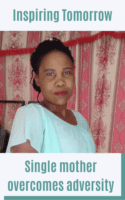Life can pull you in different directions that will force you to make decisions that will change your life forever. From having a child with no support at a young age, to losing her mother and her brothers, to being an essential worker during lockdown, our next inspiring tomorrow has been through it all. Despite all this, her motto in life remains, “Live for today, tomorrow will sort itself out.”
Siziwe Mahonono was born on the 4th of August 1976. She is the fourth of five children and she was the only girl amongst four brothers. Her mother worked in the Western Cape as a domestic worker. Siziwe was born during a turbulent political time in South Africa so her mother decided to send her to stay with her grandmother in the Eastern Cape when she was around four years old.
“My grandmother was more of a mother to me than my mother ever was but that is not to take away anything from my mother because she tried the best she could.”
Siziwe describes her childhood as peaceful. She grew up at iNtabethemba in Thornhill. As much as she had many siblings, they didn’t grow up together. Siziwe finished primary school in Thornhill, but after failing grade 10, her grandmother sent her to stay with her mother in Cape Town. She failed grade 10 twice and at 21 years old, while doing grade 11, she fell pregnant.
“It was very normal to have siblings that you have never met back then. I met my brothers when I was older and that was normal for us. As for school I just think that I just was not serious about anything back then.”
Getting pregnant was the scariest time of her life. She dropped out of school and started looking for a job because her mother told her she was not going to take care of her and her baby. She started working at a spaza shop and saved some money. Her first-born arrived in winter of 1997.
Raising a child as a single mother is one of the hardest challenges that Siziwe has ever faced. When her child was around three years old, Siziwe got a job at County Fair, a factory that packs meat for big shops like Shoprite. The job required her to work day and night shifts, which meant she needed someone to take care of her child. At this time Siziwe’s mother’s health was declining, so Siziwe decided to send her daughter to other family members in the Eastern Cape.
“The decision to take my daughter to the Eastern Cape was because I was really struggling, I grew up poor and I wanted my child to be raised different than I was. But I had no idea that I would end up regretting ever sending my child there.”
That is where her daughter was raised while Siziwe was busy working and taking care of her mother. Years went by and working in such a cold place (they were working in cold containers, like a big fridge) was starting to affect Siziwe’s health, but she ignored her concerns. In 2006, her mother and her second oldest brother died. That year was the beginning of the end as a year after that she lost her other two brothers as well. She was left with her youngest brother, Toto.
Siziwe is not one to dwell on the negatives. Around 2010, she got a new job at a vegetable farm factory where they plant, harvest and package vegetables like carrots, beetroot and potatoes. Her brother Toto by this time was causing havoc as he was involved in criminal activities and was addicted to drugs. His actions ruined their relationship and she sent him to stay in the Eastern Cape. In 2011, Siziwe fell pregnant with her second child, Liya.
When Liya was born in 2012, it was the happiest time for Siziwe. She had a good paying job and for a change she could afford to take care of her child. But in 2013 she sent Liya to stay with her older sister in East London because she needed someone to take care of Liya after crèche. Her first-born was matriculating in 2014. Around this time Siziwe found out that her children were not being treated well by the other family members. Not knowing the things that her children went through during that time is one of her biggest regrets.
“I think my biggest regret in life is not being there for my children when they needed me the most. I thought that them not living with me was the best decision but it really wasn’t. But those are the types of decisions that we all have to live with as parents.”
At the end of 2014, both her children came to stay with her and relief is what she still feels to this day.
Siziwe is considered an essential worker during lockdown and this surprised her as she always felt so insignificant as a domestic worker.
One thing she wishes and prays for is continuing with her education.
“I am not educated and that’s mainly because of circumstance, but I always encourage my children to stay in school because I know and I have lived the life of wishing that I had stayed in school. Is filling plastics with carrots my dream job? No. Does it feed my family? Yes, which for me is what matters the most.”
Siziwe plans to continue with her education in the near future. The COVID-19 pandemic has made her realise that life is too short. Siziwe is a mother, a daughter, a sister and a friend. Her story is the story of many women in South Africa. Her perseverance in the face of adversity is what makes her story unique.
Read about a mother who followed her dreams to become a social worker here.
***
Tell us: How have you overcome adversity in your life?






